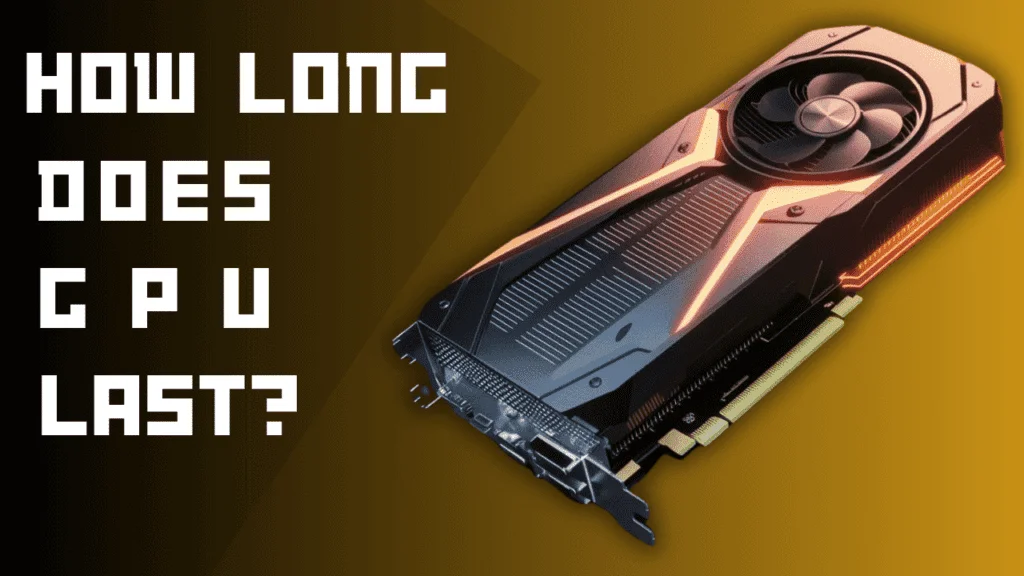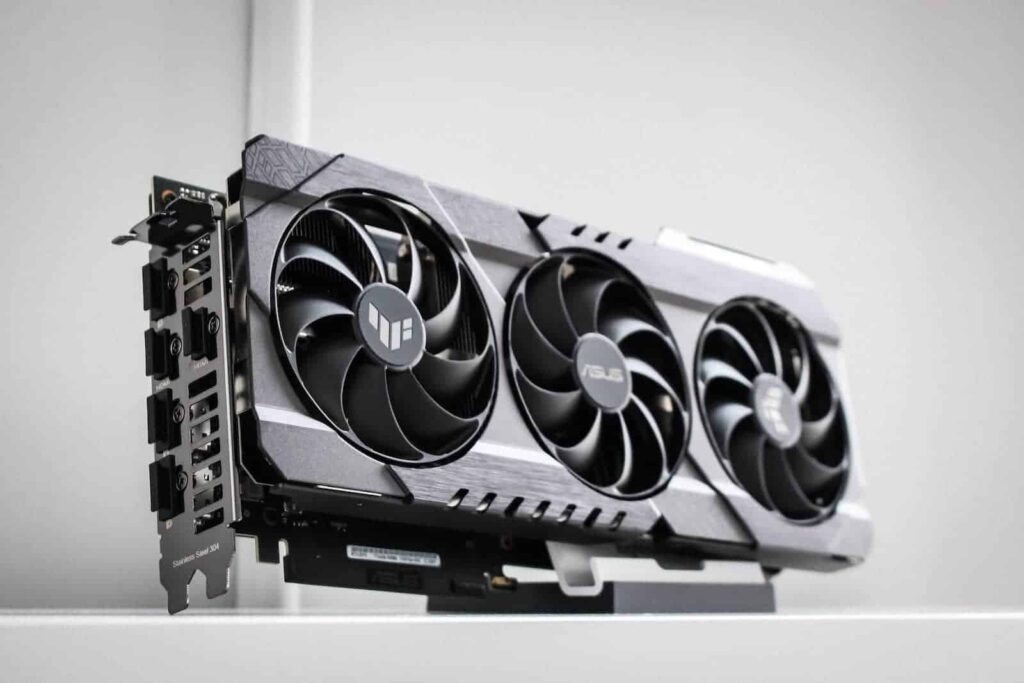Table of Contents
I’ve been using my GPU for over 4 years now, and it’s still running smoothly. From gaming to video editing, the lifespan of your GPU depends on usage and maintenance. Regular cleaning and proper cooling can significantly extend its longevity, as my experience shows.
How long does GPU last ? The lifespan of a GPU depends on use and care. Proper maintenance can help it last longer, even with heavy tasks.
Stay tuned with us! We’ll dive into the details and explore how long does GPU last, including tips to make yours last longer. Don’t miss out.
How long does GPU last?

A GPU can last anywhere from 3 to 8 years, depending on how much it is used. If you play heavy games or run demanding programs, it may wear out faster. Over time, the hardware can become outdated, making it less efficient for newer software.
Taking care of the GPU, like keeping it cool and clean, can help it last longer. However, even with good maintenance, technology advances, and you may need to upgrade to keep up with new graphics and performance requirements.
What is a GPU?
A GPU, or Graphics Processing Unit, is a part of a computer that helps create images and videos. It works alongside the CPU to process and display visuals on the screen. GPUs are important for gaming, video editing, and other tasks that need strong graphics.
Unlike the CPU, which handles many tasks, the GPU focuses on graphics and makes them look better and run smoothly. It can handle lots of data at once, making it faster for rendering images and videos.
Average Lifespan of a GPU:
The average lifespan of a GPU is around 3 to 5 years. It can last longer with proper care, like keeping it cool and clean. However, as technology improves, the GPU may become outdated before it physically fails. Heavy use can also shorten its life. If the GPU is used for gaming or demanding tasks, it might need replacing sooner. Regular upgrades help keep performance at its best.
Read More: Do Gpu brand matter – Simple Guide 2024!
How Does Usage Affect GPU Lifespan?

Heavy Gaming and Graphics Work:
Intensive gaming or graphics work puts a lot of pressure on the GPU. This constant demand can cause the GPU to wear out faster, reducing its lifespan. The more complex the game or task, the harder the GPU works, increasing its wear.
High Temperatures:
Running a GPU at high temperatures for long periods can damage its components. Overheating is a common cause of GPU failure and can significantly shorten its life. It may also cause the thermal paste to degrade, reducing cooling efficiency.
Overclocking:
Overclocking increases the performance of the GPU but also raises the risk of damage. Pushing the GPU beyond its designed limits can lead to faster wear and tear. While overclocking may boost short-term performance, it can lead to long-term instability and damage.
Light Usage:
When a GPU is used for basic tasks like browsing the web or watching videos, it is under less strain. This lighter usage tends to extend the GPU’s lifespan. The reduced workload allows the GPU to stay cooler and function more efficiently over time.
Regular Maintenance:
Keeping the GPU clean and ensuring good airflow can prevent dust buildup and overheating. Proper maintenance helps the GPU stay cool, improving its longevity. Cleaning fans and ensuring airflow also prevents hardware failure caused by blocked ventilation.
Importance of Proper Cooling:
Proper cooling is important for a GPU to perform well and last longer. When a GPU gets too hot, it can slow down or even get damaged. High temperatures can cause the components to wear out faster, leading to a shorter lifespan.
Good cooling helps keep the GPU at a safe temperature. This can be done by using fans, heatsinks, or liquid cooling systems. By managing heat effectively, the GPU stays efficient and runs smoothly for a longer time.
Read More: Can Over Clocking Damage GPU – Comprehensive Guide 2024!
Maintenance Tips to Make Your GPU Last Longer:
- Keep it Clean: Regularly remove dust from the GPU and surrounding components to prevent overheating.
- Ensure Proper Ventilation: Make sure your PC case has good airflow to help keep the GPU cool.
- Monitor Temperatures: Use software to check the GPU temperature and avoid it getting too hot.
- Avoid Overclocking: Overclocking can stress the GPU and reduce its lifespan; use it within its recommended settings.
- Use Quality Thermal Paste: Reapply thermal paste to the GPU if necessary to improve heat transfer.
- Update Drivers: Keep GPU drivers up to date for optimal performance and efficiency.
- Keep the System Clean: Regularly clean the entire PC to ensure no dust or debris affects performance.
- Place the PC in a Cool Area: Avoid placing the computer in hot or poorly ventilated areas.
Signs Your GPU Might Be Failing:
- Artifacts on Screen: Strange colors, lines, or flickering graphics may appear, indicating GPU issues.
- Frequent Crashes or Freezes: The computer may crash or freeze during graphics-intensive tasks.
- Overheating: If the GPU temperature keeps rising despite proper cooling, it might be failing.
- Low Performance: A noticeable drop in frame rates or lag during games and applications can signal GPU problems.
Can You Upgrade Your GPU?
Yes, you can upgrade your GPU. Most desktop PCs allow for easy GPU upgrades. You simply remove the old one and install a newer, more powerful model.
Before upgrading, make sure your PC is compatible with the new GPU. Check the power supply, motherboard slots, and case size to ensure it fits properly. This upgrade can improve performance in games, video editing, and other graphics-heavy tasks.
Frequently Asked Questions:
1. How Can I Tell If My GPU Is Overheating?
You can tell if your GPU is overheating by monitoring its temperature using software like MSI Afterburner or GPU-Z. If the temperature exceeds 85°C, it may be overheating.
2. How Do I Clean My GPU?
To clean your GPU, first turn off your PC. Use compressed air to blow away dust from the fans and heatsinks. Avoid touching the components directly.
3. Can a GPU Become Too Old to Run New Games?
Yes, older GPUs may struggle to run new games due to outdated hardware. They might not support newer graphics technologies, leading to lower performance.
4. How Often Should I Replace My GPU?
You should replace your GPU every 3 to 5 years, especially if you notice performance drops or it can’t handle new software and games effectively.
5. What Causes GPU Artifacts?
GPU artifacts, like strange colors or lines on the screen, can be caused by overheating, driver issues, or hardware damage to the GPU.
6. Can Overclocking Damage My GPU?
Yes, overclocking can damage your GPU if not done carefully. It increases heat and stress on the GPU, which can shorten its lifespan.
7. Do Laptops Have Upgradeable GPUs?
Most laptops do not have upgradeable GPUs. However, some gaming laptops allow for GPU upgrades, but this is rare and often limited to certain models.
8. How Can I Extend My GPU’s Lifespan?
To extend your GPU’s lifespan, keep it clean, ensure proper cooling, avoid overclocking, and monitor its temperature regularly.
9. Can My GPU Handle 4K Gaming?
To play games at 4K resolution, you need a high-performance GPU. Check your GPU specifications to ensure it supports 4K gaming, as older models may struggle.
10. Is It Safe to Buy a Used GPU?
Buying a used GPU can be risky, as it may have wear and tear or hidden issues. If you do buy a used one, check for warranty and test its performance before purchasing.
Conclusion:
The lifespan of a GPU depends on how it is used and maintained. Regular cleaning, proper cooling, and avoiding overclocking can help it last longer. However, as technology advances, upgrading your GPU may be necessary for optimal performance. Even with good care, heavy usage can shorten its life.
Keep an eye on signs of failure, like overheating or poor performance. If you notice issues, it might be time to upgrade or replace your GPU.
